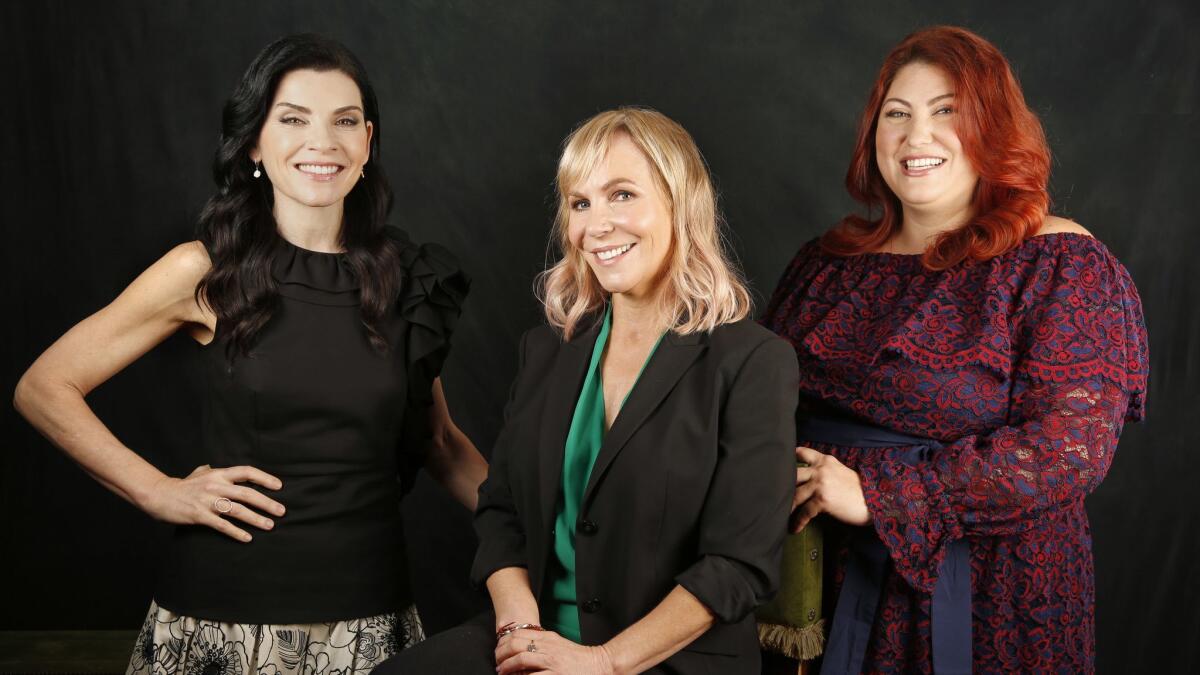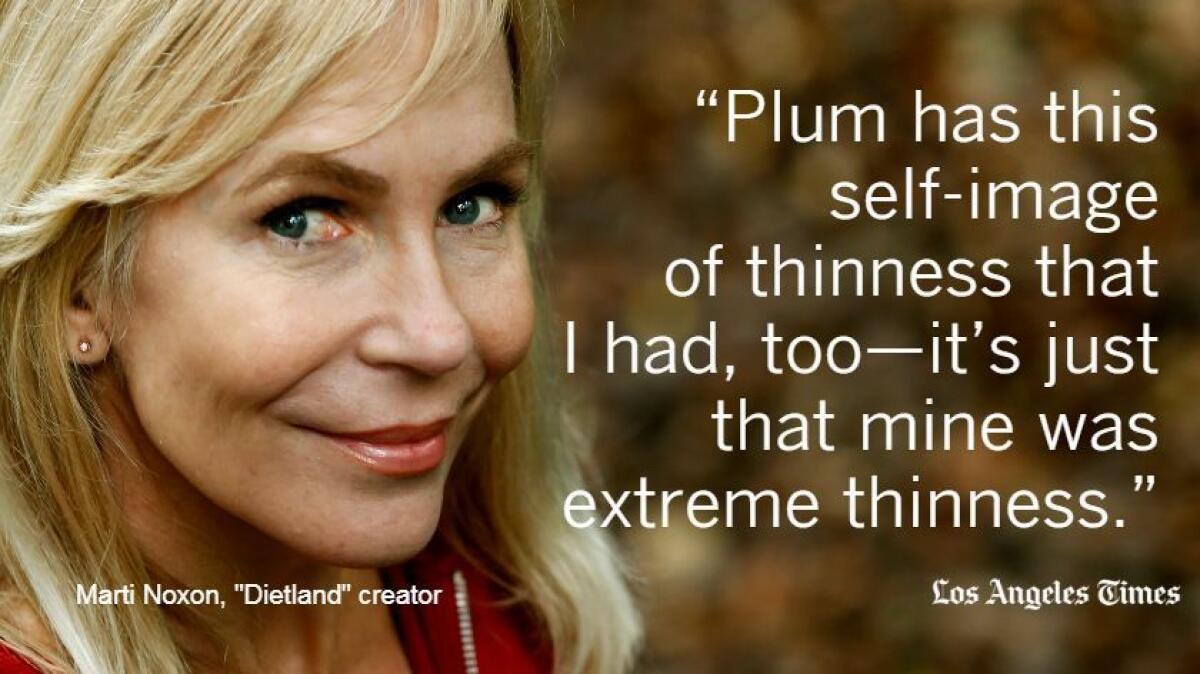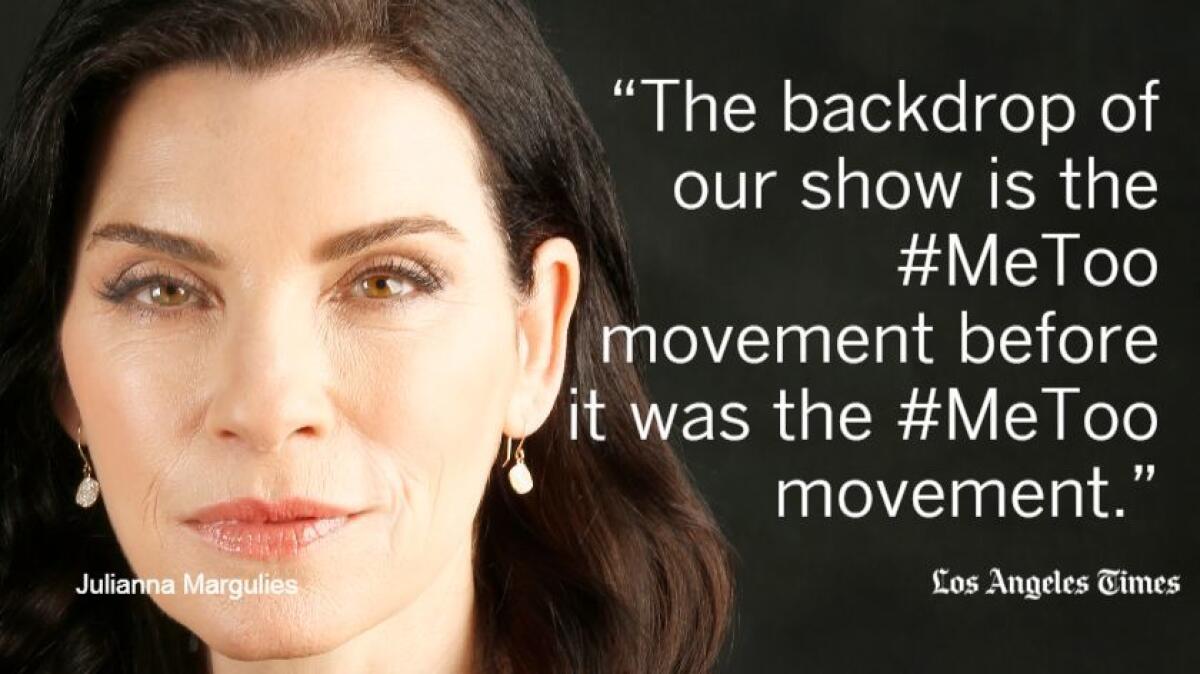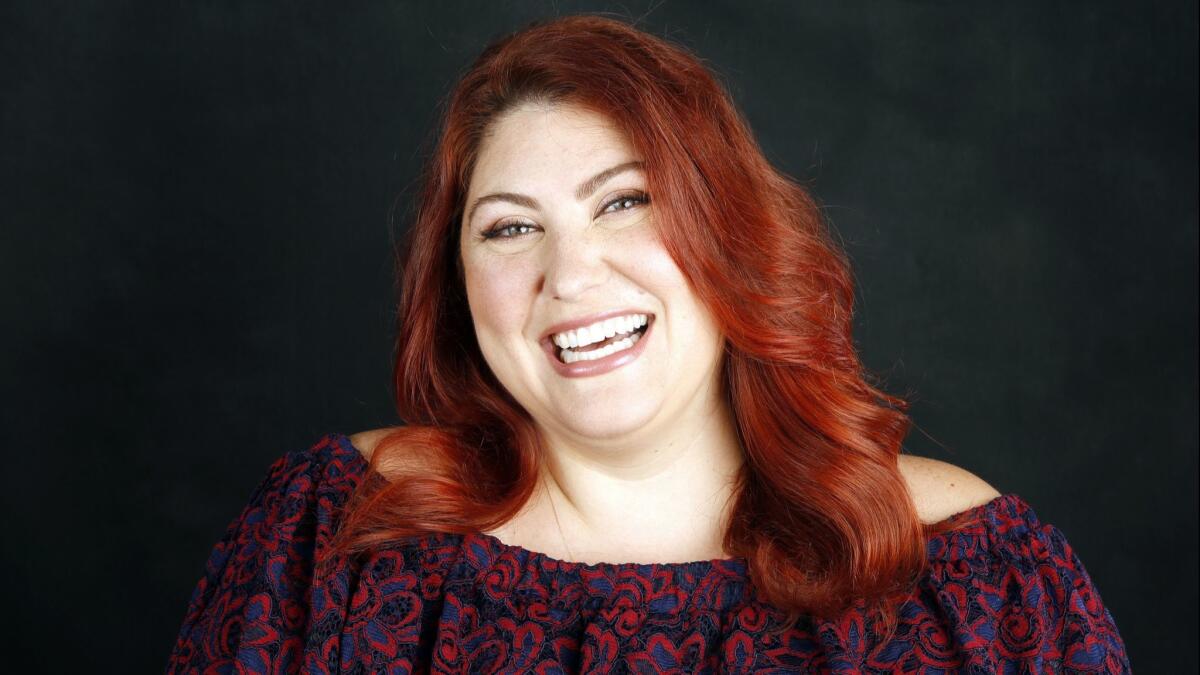AMC’s ‘Dietland’ presents a different kind of transformation story

Marti Noxon remembers it clearly. The writer and producer behind “UnReal” and “Girlfriends’ Guide to Divorce” was pitching her latest feminist manifesto to networks during the 2016 election. And it felt all too appropriate.
On parade was “Dietland,” her adaptation of Sarai Walker’s 2015 satirical novel, which is partly a self-acceptance story and partly revenge fantasy. It focuses on Plum Kettle, a ghostwriter for a high-powered (and fashionably slim) editor at a posh women’s magazine. Plum, at 300 pounds, struggles with her body image and is saving up for weight-loss surgery when she unexpectedly gets caught up in an underground feminist movement.
“I remember pitching on a day when [Donald Trump] was mocking a contestant from one of his beauty pageants for being fat,” Noxon says. “And I thought, ‘Well, this show will probably still be relevant when Hillary Clinton is president.’”
Some two years later — and Noxon’s election assumptions unfulfilled — one might assume the show was written as commentary on the current cultural climate.
The dark — at times, surreal — drama stars relative unknown Joy Nash as Alicia “Plum” Kettle and Julianna Margulies (“The Good Wife”) as her self-absorbed magazine boss Kitty Montgomery. The series, debuting Monday on AMC, arrives during a critical juncture for womanhood. The Trump era has seen the galvanization of scores of women who are more energized and strong-willed not only in their resistance to the current administration but also in the broader fight against men’s unchecked power as illustrated by the #MeToo and Time’s Up movements.
“The thing about the show that really attracted me in novel form was that it starts as a story about body image and self-acceptance — but that’s just the beginning,” says Noxon, whose writing credits include “Mad Men” and “Buffy the Vampire Slayer.” “What it becomes about is a personal revolution. And it becomes about challenging the status quo in yourself and in the entire world.”
From its start, the disruptive drama prepares viewers to reset their expectations: “Don’t think this is one of those stories,” Plum narrates from the future in the opening minutes of the first episode. “I’m still fat.”
Of course, body image is an important element to the part of the story that examines unrealistic beauty standards. Plum — nicknamed such because, as she says, “I’m succulent and round, also known as ‘fat’” — spends the first couple of episodes loathing herself and adhering to the idea that her life will start when she is thin. It’s a fallacy the women of “Dietland” hope to invalidate.

“While I haven’t spent my life dieting quite like [Plum] has, I do know what it’s like to wait for life to begin,” says Nash, who became a viral video star with her body-positive sermon “A Fat Rant.” “I had this thought, you know, once I’m in a relationship, once a guy loves me back — and those things can only happen when I’m thin — that’s when life starts. Or once I get the career I want, as a result of being thin, life will start. And it’s not like that. Life is now.”
Noxon has been open about her own struggles with eating disorders, loosely basing the 2017 Netflix film “To the Bone” on her experience with anorexia. She acknowledges that weight issues and body acceptance are an ongoing process for her — one that she’s grappled with since adolescence.
“Plum has this self-image of thinness that I had too — it’s just that mine was extreme thinness and hers is average thinness,” Noxon says. “Mine was this idea that if I could get under a size 2, then I would be happy and precious. I could never get there, and so I came to this idea that there was no ‘there’ there — that that was an illusion and a lie.
“But I’ve struggled with it my whole life. I wish I could say that I didn’t still. Just the other day, I looked at myself and I was like, CoolSculpting — hmmm, should I try freezing fat?”
It leads to a discussion on the ways in which the female body becomes public property.
“There was a man in my neighborhood who would constantly ask how many months along I was,” Nash says, “and I’d say, ‘Not pregnant, just fat, but the night is young.’ And once when I was performing my ‘Fat Rant’ monologue, a women came up to me afterward to say she loved it but then proceeded to tell me she worked for Herbalife and was telling me her diet tips.”
Noxon adds: “When I was way too thin, people would pull down the window of their cars and tell me to eat a sandwich. I became public property when I wasn’t looking the way people thought I should look. That’s why this book was a revelation for me.”
The TV maven came across the novel while browsing Audible, saying the cover art bearing a frilly cupcake with a grenade pull piqued her interest.
“I could tell from the cover that it clearly wasn’t a diet book,” Noxon says. “The book kept setting me up, making me think it was gonna be a chick lit novel, that Plum’s character was going to turn a corner and find true love or something. But it just kept getting deeper and more real and subversive.”
Part of the subversive element is in the misogyny and sexual assault portion of the story. An all-female vigilante organization, which is called Jennifer, revolts against men who’ve been accused of hurting women — their tactics include dumping the bodies of sexual predators onto busy freeways. Plum slowly gets enlisted into its fold.

Noxon and the show’s largely female writing staff began crafting the season last summer — before scores of women came forward and jolted Hollywood with a wave of sexual assault allegations that brought about the downfall of movie producer Harvey Weinstein and many others. That makes the show all the more vital, Margulies says.
“The backdrop of our show is the #MeToo movement before it was the #MeToo movement,” she says. “The Jennifer movement in the show is definitely a vigilante movement. I would hate for anyone to copy any of it. But the fact that women are finally taking the law into their own hands and saying, ‘You know what? Screw this. These guys sexually abused these women; we’ll take care of them because you’re not doing anything’ — I think that’s what we’re seeing right now. Women have had it.”
Noxon, who supported writer Kater Gordon in her sexual harassment allegations against “Mad Men” creator Matthew Weiner (which he denied), views the “real-time” feeling in which “Dietland” now finds itself as an opportunity to keep the conversation active.
“That’s the excitement of the show — the subject matter is so alive right now,” she says. “We have the ability to be in the discussion and to also push it forward.”
“Dietland” joins Noxon’s growing female narrative empire — which also includes her adaption of Gillian Flynn’s “Sharp Objects,” starring Amy Adams, for HBO later this summer — that has worked to spark conversations about the pressures, and expectations, society places on women.

But the drama’s ambitions weren’t understood by all, Noxon recalls. During the pitching phase, a few networks didn’t totally grasp its mission.
“One executive at one place did say, and I’m not kidding you, he said, ‘So when does she go through a transformation?’ Physically,” Noxon says, not referencing the TV outlet by name but noting that “they drop products at people’s houses with drones.”
For AMC, which has produced its share of commanding female heroines (Peggy and Joan of “Mad Men,” Cameron Howe and Donna Clark of “Halt and Catch Fire”) in its mostly testosterone-skewing narratives, “Dietland” presents a more direct attempt at programming to women — with women at the helm.
“Having a show that has such a powerfully expressed female point of view and such a rich and complicated female point of view, courtesy of Marti, is something I’m thrilled about for the network,” says David Madden, president of original programming for AMC, Sundance TV and AMC Studios. “I hope that ‘Dietland’ is another step in our expansion of point of view and the perspective that the network wants to explore.”
The show, as Noxon sees it, is an empathy train. And it has two dynamic female characters propelling it, along with the conversations it incites, forward.
“Kitty has no moral center. I equate her a bit to Trump. She doesn’t care what it takes to win; she just wants to win,” says Margulies of her first regular series role since “The Good Wife” ended its run in 2016. “But she’s also someone who’s had to climb and scrape and pretend she was dumb in order to get where she is because she is a woman. And I think that’s what a lot of women face today. Still.”
Nash sees her power of influence in just being.
“I feel like that’s the point of this show for me: to be visible. I’m the lead. Look at me. Look at all of me because there’s nothing wrong with me.”
ALSO
Review: Why Marti Noxon’s ‘Dietland’ is the right show for this Time’s Up moment
‘Dietland’
Where: AMC
When: 9 p.m. Monday
Rating: TV-14-DLSV (may be unsuitable for children under the age of 14 with advisories for suggestive dialogue, coarse language, sexual content and violence)
Twitter: @villarrealy
More to Read
The complete guide to home viewing
Get Screen Gab for everything about the TV shows and streaming movies everyone’s talking about.
You may occasionally receive promotional content from the Los Angeles Times.







